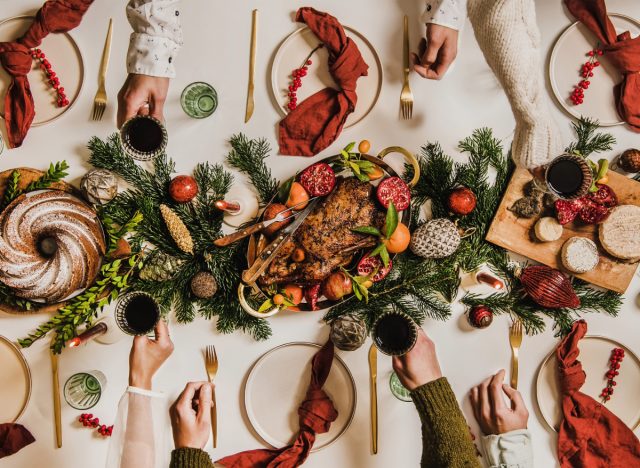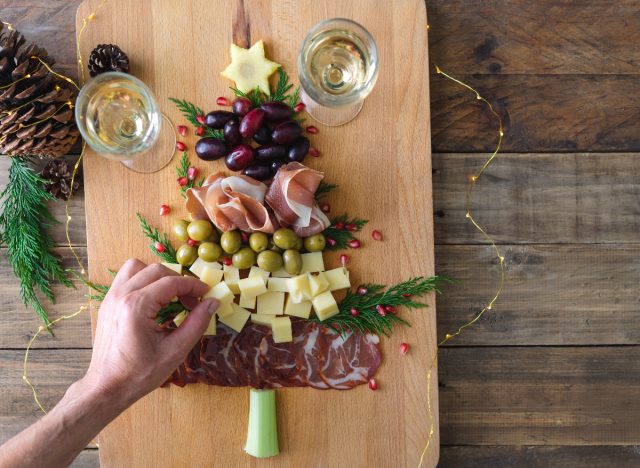9 Simple Tricks To Avoid Holiday Weight Gain

'Tis the season to attend holiday gatherings that are filled to the brim with delights like sticky toffee pudding, chocolate peppermint cookies, sweet sugarplum candies, spiked eggnog… and the list goes on. These treats sure do taste decadent but can make weight gain easy if you're not careful. While it may be tempting to treat yourself to every holiday cocktail, side dish, and dessert you set your sights on, a few smart habits can help you enjoy this merry time of year without packing on unwanted pounds. We spoke with experts who share nine simple tricks to avoid weight gain over the holidays.
Have an accountability partner.

Having a friend or loved one as an accountability partner can help you monitor your food and beverage choices and navigate holiday gatherings with ease.
"Photos of food might be a fun way to share the experience and discuss the benefits and drawbacks of certain options available during a meal," explains Jennie Norton, MS, RDN, CD, a registered dietitian nutritionist at RET Physical Therapy and Healthcare Specialists. "Maybe both people even set weight goals ahead of time for the season (i.e., no change in weight by January 31). In that case, that might be a focused way to limit overeating or drinking excessively."
Encourage loved ones to participate in holiday-themed movement activities.

Lacing up your shoes and heading out for a brisk walk while playing holiday tunes is an excellent way to get moving after a hearty meal and avoid holiday weight gain. You can also start an "active advent calendar" with family and friends close by to do throughout the holiday season.
"Encourage family members and friends to participate in holiday-themed movement activities after meals or as a break during the day," Norton suggests. "Outdoor fresh-air walks or indoor-focused walks (if the weather is stormy) can also be easy options for the group."
Practice portion control.

During holiday gatherings, it's easy to match your portion sizes to other plates on the table—or reach for another serving of the sweet potato casserole. In fact, research shows that people dining with others typically consume a lot more food than they would if they were eating alone.
Norton encourages you to practice portion control. "Aim to make half of your plate non-starchy vegetables. Examples include green leafy salads and cooked vegetables such as cauliflower, broccoli, cabbage, and Brussels sprouts," she explains. "[In addition,] consider creating a 'sampler plate' of small portions of each available dish on the table so you don't miss out on any favorite or enticing new dishes."
Be mindful of your hunger and satiety during meals.

Reconnecting with loved ones while sitting at an aesthetically pleasing table can make it challenging to stay mindful of one's sense of fullness.
"It might be helpful to practice using the hunger scale partway through the meal to assess where you are, with 1 being very hungry and 10 being very full," Norton suggests. "If you stop eating when you feel full rather than stuffed, you might be more comfortable after the meal and leave a little room for dessert."
Address holiday stress head-on.

Between mapping out social plans, hosting, baking, and gift shopping, this festive time of year can get chaotic fast, as much as it's enjoyable. "Some people [also] eat more food when stressed, while others find that they lack their regular appetite when anxious," Norton adds.
To conquer any holiday stress head-on, consider starting a daily mindfulness practice before the season begins. You may also find it helpful to perform five to 10 minutes of light yoga stretching at the start of your day.
Dress your carbs.

Norton also suggests taking a cue from the Glucose Goddess and "dress your carbs." This means adding fiber, protein, or healthy fats to them.
"For example, if a holiday guest brings a charcuterie board to the festivities, then you can nibble on a small plate of fruit, vegetables, nuts, cheese, and crackers in addition to a few pieces of chocolate," Norton explains.
Separate your drinking and eating.

Separate your drinking from your eating.
"Eat your food and then wait 30 minutes before drinking," recommends Adiana Castro MS, RDN, CLT, CDN, LDN, founder at Compass Nutrition. "This will help your food empty out of your stomach at its own pace instead of being rushed out with all the liquids during the meal. Delayed gastric emptying helps you stay more satiated and may prevent excessive snacking in between meals."
Eat slowly.

If you want to avoid holiday weight gain, eating slowly and genuinely enjoying each bite is essential.
"Digestion starts in the mouth, so remember to chew your food well," says Castro. "Aim to chew 20 to 25 times per bite. This will signal the brain that food is coming to the stomach and to be prepared to release satiety hormones."
Get enough sleep.

During the holidays, it's easy to be short on sleep as you whip up festive meals, decorate, and gear up for hosting family. However, don't push a restful night's sleep to the back burner!
"Experts recommend that adults get seven to nine hours of sleep per night to help support a healthy body," Norton tells us. "Several tips for improving sleep quality include keeping the room dark and cool like a cave (between 65 and 68 degrees Fahrenheit), maintaining a consistent wake time every day, limiting caffeine after 2 p.m., and tracking your sleep to determine any factors that might be reducing the quality or duration."









